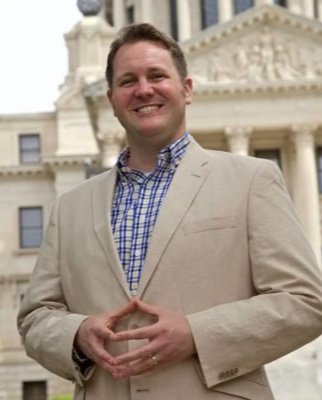 As a political science professor and longtime politico, I spend a great deal of time weaving between the worlds of political practitioners, academics, journalists, and students with varying degrees of interest and knowledge of the political process. Needless to say, I was intrigued by the news reports about the online NBC News/Generation Lab poll of the class of 2025.
As a political science professor and longtime politico, I spend a great deal of time weaving between the worlds of political practitioners, academics, journalists, and students with varying degrees of interest and knowledge of the political process. Needless to say, I was intrigued by the news reports about the online NBC News/Generation Lab poll of the class of 2025.
If you missed Michael’s show last week, it may be of interest to you that 46 percent of these students said that they probably would not or definitely would not room with someone who supported the opposing 2020 presidential candidate that they backed. Likewise, 53 percent said they wouldn’t go on a date with such a person and 63% said they couldn’t envision marrying someone like this.
As a moderate centrist who started college as an undergrad in 1999 and was heavily influenced by the great Al From and the DLC, I was initially frightened and appalled by these results. I flashed back to how many of my closest friends and I—both then and now—hold vastly different political positions from one another and have managed to never allow that to erode our friendship. It made me think about how I supported Al Gore in 2000 and placed a Gore sign in my dorm room window. My roommate and best friend put up a Bush sign next to it. I was proud of the fact that we were both buddies and backed different candidates in a time of what we considered great division in America, and hoped that we could set an example for our peers.
After my initial grief over these poll numbers passed, I started thinking about it through the lens of 2022 instead of the lens of 2000 when I was coming of age politically and a year before I went to intern for my hero, the late Senator Arlen Specter. Those of us who reacted by lamenting the passing of the “good old days” of bipartisanship in politics need to check ourselves because we aren’t necessarily reflecting political reality as it stands today. Let me put it this way: I am proud of the fact that I have worked for both Democratic and Republican elected officials and candidates in my career. It helped make me a better citizen and now, a better political science professor. Although I’m proud of my experience, I don’t think it is indicative of how things work today.
The students who come through my office or classroom door now were not raised in the era of Ronnie and Tip cutting deals over a highball at 5:15 pm. They weren’t of age—and some weren’t even born—when we rallied together on September 12 after the worst day of our lives had concluded. These are young people coming of age in a time of extreme partisanship, polarization, and political anger. Their formative experiences have been toxic tweets and nasty Facebook posts. As such, I wouldn’t expect them to have the feelings I did of my peers whom I disagreed with twenty years ago because the disagreements—and what we disagreed about—have changed so very much.
Democrats today tend to believe that Republicans are an existential threat to the future of the republic and Republicans believe the same as Democrats. The fact that many college students do not want to room with, date, or consider marrying those in the opposite camp should come as no surprise given the time and place in which we live politically. This is certainly not a positive thing, but it is our reality. And truth be told, we know that the far-right bears much of the responsibility for the current environment and that it is unfair and inaccurate to say that it is a “both sides” phenomenon.
With that said, I interpret the results of the NBC News/Generation Lab poll to be speaking directly to those of us who are teachers, professors, and those who influence young people at this age right now. We must do all that we can to break down these barriers to make sure that we normalize bipartisanship, moderation, and understanding among those with deep disagreements again. I acknowledge that many of the students in my classes deeply disagree with the people sitting around them, but I won’t surrender to this impulse, and I don’t think any of us should. We ought to foster as many ways for college—and even high school students—to learn with and from one another as possible so that we can be proactive in making the political system functional once again.
In short, I want to encourage every student to talk to their peers to ask why they believe what they do, why they vote the way they do, and what motivates them when it comes to public life and politics. They will never agree on everything, but the process begins with fostering an understanding that allows us to cast aside the present paradigm of political discord and replace it with true political discourse.
At the end of the day, it is less about the “kids” or students than it is about us. Professors, teachers, journalists, parents, and those who have access to the spaces these young people exist in have to set the tone. Stop calling all liberals “communists” and stop calling all conservatives “fascists.” If we are going to do better as a society, it starts with those of us in the positions that influence behaviors in which young people take their cues.
Hamilton once said that “When the sword is drawn, the passions of men observe no bounds of moderation.” He was right, but he also lived in a time before Twitter. I have unwavering faith in today’s young people such as high school and college students to rise above the toxic environment we have created for them. However, we must set the stage for them to rise above the morass we are collectively responsible for making.

Dr. Nathan Shrader
Dr. Nathan Shrader serves as associate professor of political science and co-director of the Center for Civic Engagement at New England College in Henniker, NH. He can be reached at [email protected] and welcomes all feedback. Shrader previously served as legislative aide to Lt. Governor Catherine Baker Knoll of Pennsylvania, legislative aide in the Virginia General Assembly, and research assistant at the Temple University Center on Regional Politics and Institute for Public Affairs.






